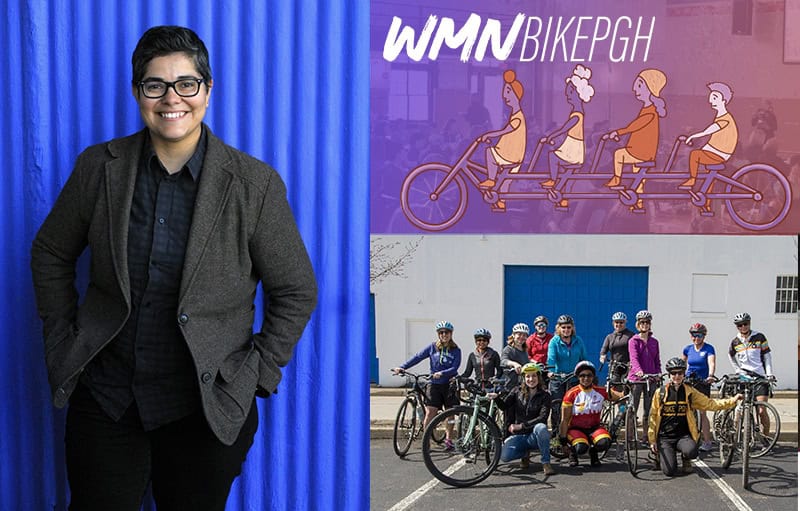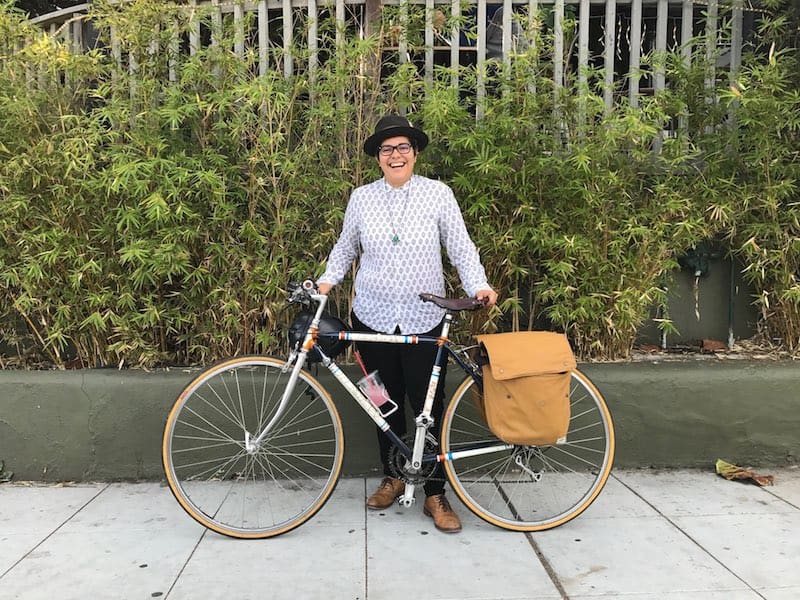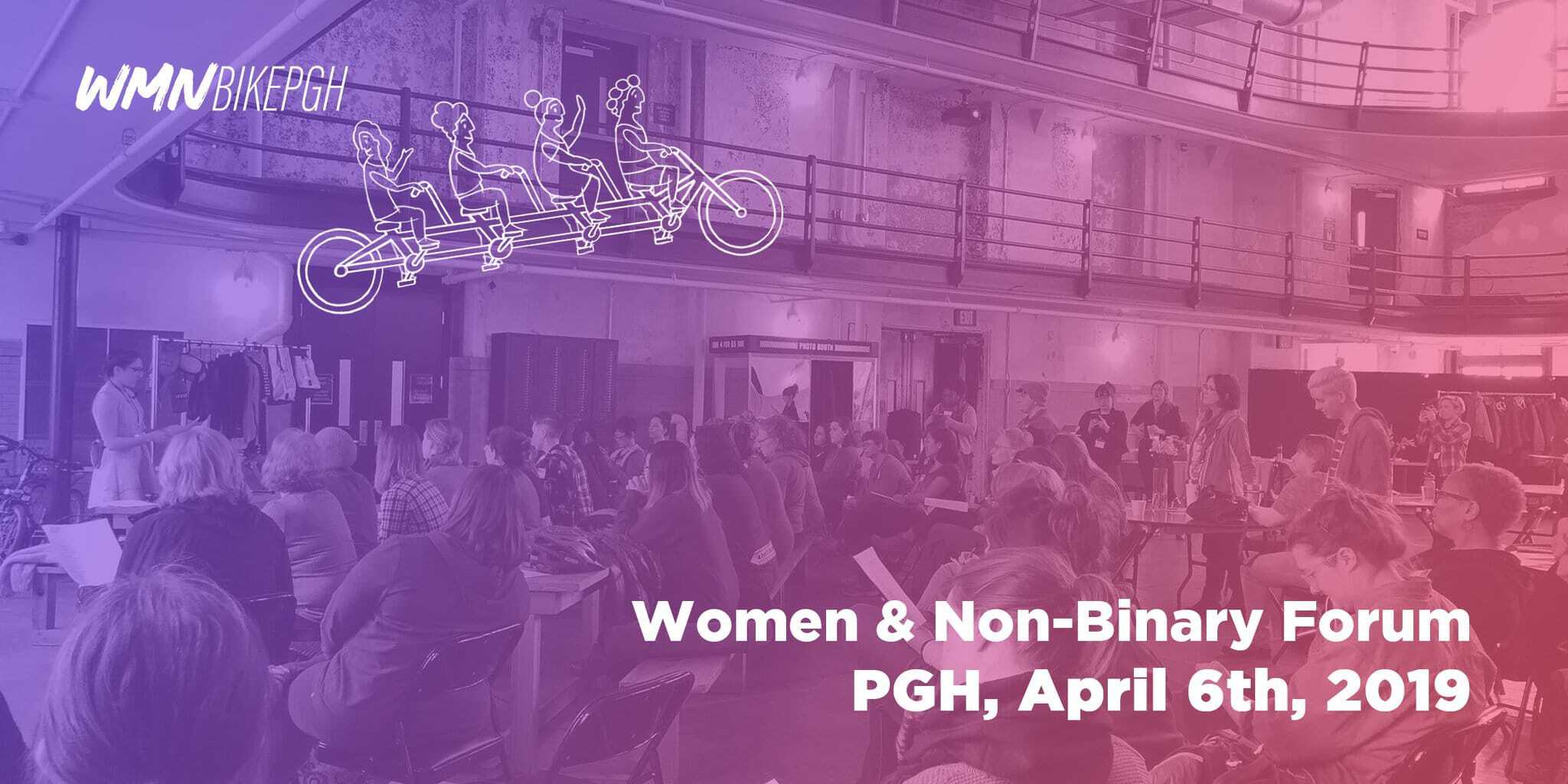
Keynote Speaker Announced for BikePGH’s 6th Annual Women & Non-Binary Forum presented by Dollar Bank
The annual forum brings together women and non-binary people from across the region to talk about shared experiences, challenges, and tools to address mobility, biking, advocacy and more. This day of camaraderie includes learning, networking, skill-sharing, expert information and a chance to ride your bike. Click here to learn more and register!
The keynote speaker for this year’s Women and Non-Binary forum is Monique G. López (pronouns: fluid). For more than a decade Monique has been a social justice planner and policy advocate working on transportation justice, environmental justice, and public space access throughout Southern California.
Monique works with communities using planning tools through storytelling and arts-based engagement to dismantle unjust systems and build equitable communities. Her work is rooted in a simple principle: The voices of residents should be respected as experts, and as such, should dictate the planning and design of their community.
Monique is the founder of Pueblo, a values-driven participatory planning and design firm. As a social enterprise, their work with agencies subsidizes our work with Community Based Organizations so that they can provide low-cost technical support for community-driven plans and designs.
Monique is a certified planner with the American Planning Association and has earned a Master’s degree in Community and Regional Planning from the University of Oregon and a Master’s in Political Science from California State University, Long Beach. She has also earned her Bachelor’s degree in History and Political Science with a Minor in Religion from Vanguard University.
Learn more about Monique in our Q&A
What led you to your passion for environmental and social justice?
I grew up in a small rural community in Imperial County out by the Salton Sea. This community is plagued by numerous environmental injustices such as hazardous waste facilities, field burning, pesticide spraying, and toxins from the geothermal industry. Yet, time and time again I witnessed elected officials and others with political influence move forward plans and policies with negative health and economic impacts, without consulting the people that these decisions impact most.
But in my early 20s when they tried to build a sewage sludge incinerator in my community, I finally drew the line — I got involved in a grassroots campaign to stop it and we won!
It was there that I learned the importance of community members being able to develop their own creative solutions that meet their needs. This early experience in my hometown, at the beginning of the formation of my worldview as a professional, has deeply influenced my approach to planning, design, and policy development.
How has cycling empowered you?
For much of my adult life I haven’t had a car. In my late teens and 20s that was primarily because of economic reasons. Cycling and public transit, empowered me to go to school, work, and connect with friends. Cycling for me has always been about not just mobility, but upward mobility. Additionally, cycling for me hasn’t just been about getting from point A to point B, but is has been about exploration and community connections.
How do you address social biases and inequality in your classrooms?
Creating intentional space for women and POC to share their stories and experiences. Bringing in readings, topics, and guest speakers into the classroom that have a clear social justice perspective.
What have you found to be the biggest obstacles towards creating fully accessible public spaces?
Privilege – people not wanting to acknowledge or give it up.
How can community planning and urban design address the unique needs of women and non-binary cyclists?
I am part of the next generation of planners who have experienced first-hand how planning, design, and policy have historically embedded generations of structural racism and sexism in the built environment. I am also part of the next generation of planners that see great potential to provide opportunities for residents to use these planning and design tools to reshape their communities equitably, holistically, and sustainably.
With the rise of inequality, climate change, and negative impacts of decades of top-down planning, do we have any choice but to try something new?
Which community programs or projects have you found that engage the most women/gender nonconforming people?
You’ve got to seek and build relationships with people where they are. We did this in the “How Women Travel Project” for our client, Metro.
Even the most nuanced, thoughtful survey and focus groups have limitations: some populations are very difficult to reach, including those who are linguistically isolated, illiterate, or digitally disenfranchised. Hence, Pueblo facilitated participatory design workshops, and conducted pop-up engagement that specifically engaged with some of Metro’s most vulnerable riders which include undocumented/immigrant women, houseless women, and those with disabilities. Pueblo did this by meeting the women where they are through pop-ups at local transit stations where they can share their stories and through partnerships with community based organizations that provide services to these communities of women.
In the winter of 2019, Pueblo facilitated participatory design workshops where women engaged in an art-making and storytelling activities that allowed them to share both physical and emotional experiences while riding metro and identifying elements that have made them feel that way. Through this women were able to share what part of their transit experiences they both enjoy and believe could be improved.
In an effort to accommodate the participants and remove common barriers to engagement, child-inclusive workshops, food, translation, and useful gift cards will be provided to the participating women. Additionally, community based organizations were compensated for their time in organizing and hosting the event. Lastly, Pueblo is committed to circling back with participants at the end of the study to share with them results and how the information they shared will be generally used by Metro.
Also during the winter of 2019, Pueblo staged beautifully installed “pop-up” engagement activities in or near transit facilities. There they gathered the perspectives of self-identified women travelers. Riders were asked two questions while they are waiting for their train on the platform; “what makes your ride difficult” and “what would make your ride easy”. These questions were consistent at all three pop-ups to determine if there are different type of experiences for people using different lines.
People who identify as women, men, gender non-binary, or another gender identity were able to self identify on a notecard and had an opportunity to write a quick response (facilitators wrote on the note for women who prefer not to write) and add it to a growing tapestry of responses; thus, eliciting an artistic spectacle that encouraged more people to participate. Each pop-up was approximately three hours on or near the transit platform (dependent upon the safest location). Through this effort, Pueblo better understood patterns of behaviors, needs, and experiences.
Show us a photo of your current/favorite bike!
1970s Nishiki Racing Frame (Custom paint job by bike artist and mechanic Kate Cowper)


Save the Date and Join Us!
Whether you are interested in learning more about bike fit, bike gear or becoming a stronger advocate for safe cycling, there will be a workshop for you. Don’t miss BikePGH’s Women & Non-Binary Forum on April 6th! Tickets now available: http://bit.ly/2QTHVSy
